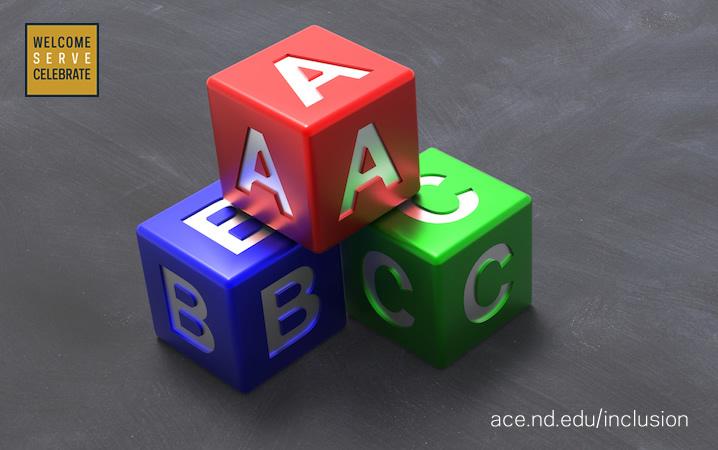The Program for Inclusive Education is grateful for the many skilled and generous colleagues who support our programming. It is my privilege to welcome Diane Freeby and Judy Madden as guest authors. Diane and Judy serve our ACE community and the many educators that pass through our doors. Their gifts are boundless and their laughter infectious. Thank you for your contribution to our mission and sharing your thoughts with the PIE community!
~Christie Bonfiglio, Ph.D.; Director of the Program for Inclusive Education
Over the last few months, educators, students, and families were forced to switch gears in unprecedented ways given the COVID-19 pandemic. Requirements to shelter in place meant teaching, learning, and working from home for many of us. Although routines were disrupted, we did hard things and achieved more than we may have thought possible. As we wrap up an academic year that required great flexibility and adaptability, how do we prepare now for whatever lies ahead?
We sat down with Judy Madden, ACE's Student Support Specialist. She reminds us how important self-care and rejuvenation are as we prepare to find balance when school resumes this fall, whatever form that takes. Looking ahead can seem overwhelming at times, but in many ways, it's as simple as getting back to the basics.
What are the biggest challenges our educators face as this school year ends and the next one looms?
The Unknown
Nobody knows what's going to happen. There are a lot of voices, so what do you listen to and what do you not? Living in that big unknown, I think, is very challenging.
Lack of Structure
As people, we like to know what day it is and that it's different than yesterday. We have tasks that we like to click off. There is value in having a to-do list and crossing off seven things - research shows it gives us some sort of psychological boost.
When there's a lack of structure, whether it's at work or at home, it can be a challenge. When you're working from home, you're still aware of what's going on in the other room. It can be hard to balance responsibilities.
Lack of Human Contact
This notion of being socially distant has been hard. When you look at social distancing, it's not the six feet; it's the "I don't get to see the friends I work with." Human contact has been removed and that's a challenge. Our teachers can't always tell if they are reaching their students. I talked with a second-grade teacher a few weeks ago who is contemplating what next year might look like. She tried to teach an in-person lesson, but some of the littles were pressing the keyboard, or they were distracted by a sibling or mom cooking behind them. It's just different, and the teacher can't stoop down to their level and look them in the eye and really engage them.
How important is it to find ways to rejuvenate ourselves if we are to have balance in our lives when school resumes this fall?
A Need for Recreation
Nature is restorative. If you can, go for a hike. Take a walk, take your bikes somewhere. Maybe even put it on the calendar as you would a doctor's appointment. You want to do some activities as a family and some by yourself.
A Need for Rest
Sleep is really important when things are out of control. Get to bed at a decent time and don't binge on Netflix-it'll be there tomorrow!
Limit Your Screen Time
If possible, put your phone on do not disturb at night, and shut screens down an hour before bed. It's not only that weird blue light—mindlessly scrolling social media can keep you up much later than you intend. Get an old-fashioned book, keep it on your nightstand, and read it!
A Need for Fuel
Fuel your body, even if you're not hungry, and do it mindfully. Make a plan at the beginning of the week and stick to it as best you can.
Prayer
I recommend some sort of morning prayer or quiet meditation. Start the day somehow anchored to your Creator. Then, at the end of the day, take a look and think about three things that you're really grateful for today. That's restorative.
Those are the big things. If people need counseling, therapy, or spiritual direction, reach out for it. There's no shame.
How important is communication?
When we talk about restoration, I think it's really important that we assume good will in our conversations with other people, with whom we agree and with whom we may not. It does us good to assume good will on the part of the other, to be gentle, to be flexible, to really try to learn. If we disagree or if something hits you wrong, just try to be gentle with them and with yourself. Be generous and gentle in our communication, and assume good will. I think it makes the world better, but it really makes us better!
It's like that poster: "All I ever really needed to know, I learned in kindergarten." Really, if we cared about ourselves like we did our children when they were young, we would be patient, we would be gentle, we would give lots of room to make mistakes.
Even in tough times, there are silver linings if we train ourselves to look for them. As we take care of ourselves and our families, let's not forget to gather those graces at the end of each day.
 Alliance for Catholic Education
Alliance for Catholic Education
